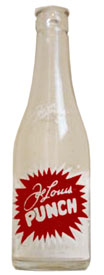Brown Belle Bottling Co.: Difference between revisions
No edit summary |
m (Dystopos moved page Brown Belle Bottling Company to Brown Belle Bottling Co.) |
(No difference)
| |
Revision as of 18:11, 1 January 2021
The Brown Belle Bottling Company was a soft-drink manufacturer and bottler founded by A. G. Gaston in 1938. The company marketed several beverages, including "Browne Belle Boogie" and "Joe Louis Punch", named for the boxing champion. It was managed by Arthur Gaston Jr and Thomas Gardner and located at 1615 4th Avenue North.
Brown Belle Boogie drinks were sold in 7 ounce green bottles bearing brown and yellow labels. Joe Louis Punch came in a clear bottle with a red and white label. The company also produced a "Brown Belle Club 67" club soda. The drinks were bottled with equipment loaned to the company by James Lee of the Buffalo Rock Bottling Company in return for a share of profits. The arrangement was kept quiet to avoid recriminations against Buffalo Rock for helping a "black company".
To market the brand, Gaston sponsored "Miss Brown Belle" contests and had pictures of brown-skinned beauties such as Marion Haynes and Florence Evans painted on the company's delivery trucks. Despite strong initial sales, the company struggled to find retail outlets for its products. The operation was also plagued by thefts, not only of receipts, but also of sugar and syrup which was believed to have been diverted to illegal stills.
When the office safe was stolen in a burglary the company lost the records it would need to defend itself in a lawsuit over the company's trade mark. In 1950, with $60,000 in debts, Gaston decided pay off creditors himself and close the business.
References
- Polk's Birmingham (Jefferson County, Ala.) City Directory, including Fairfield and Homewood (1941) Richmond, Virginia: R. L. Polk & Co.
- Carol, Jenkins and Elizabeth Gardner Hines (2003). Black Titan, A. G. Gaston and the Making of a Black American Millionaire. New York: One World/Ballantine. ISBN 0345453476
- Williams, Roy L. (November 24, 2010) "Soft drink relics reveal a black and white business link." The Birmingham News
